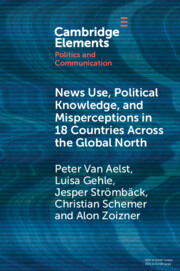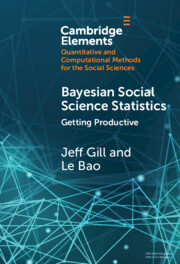Refine listing
Actions for selected content:
2326 results in Cambridge Elements

Heirloom Cultures and Heritage Branding
- The Creamy Case of Icelandic Skyr
-
- Published online:
- 23 February 2026
- Print publication:
- 31 March 2026
-
- Element
-
- You have access
- HTML
- Export citation

News Use, Political Knowledge, and Misperceptions in 18 Countries across the Global North
-
- Published online:
- 23 February 2026
- Print publication:
- 31 March 2026
-
- Element
- Export citation

The Conduct of Politics
-
- Published online:
- 23 February 2026
- Print publication:
- 31 March 2026
-
- Element
- Export citation

Sex and Sexuality in the Ancient Near East
-
- Published online:
- 21 February 2026
- Print publication:
- 31 March 2026
-
- Element
- Export citation

Legislating Peace
- How Gender Diverse Rebel Parties Encourage the Implementation of Gender Peace Agreement Provisions
-
- Published online:
- 20 February 2026
- Print publication:
- 31 March 2026
-
- Element
-
- You have access
- HTML
- Export citation

Aviation English as a Global Lingua Franca
-
- Published online:
- 20 February 2026
- Print publication:
- 12 March 2026
-
- Element
-
- You have access
- HTML
- Export citation

Early Globalism and Chinese Literature
-
- Published online:
- 18 February 2026
- Print publication:
- 31 March 2026
-
- Element
-
- You have access
- Open access
- HTML
- Export citation

Chinese Feminisms and The Vagina Monologues
-
- Published online:
- 17 February 2026
- Print publication:
- 12 March 2026
-
- Element
- Export citation

Bayesian Social Science Statistics
- Getting Productive
-
- Published online:
- 17 February 2026
- Print publication:
- 31 March 2026
-
- Element
-
- You have access
- HTML
- Export citation

Gender and Uptalk in Hong Kong English
-
- Published online:
- 17 February 2026
- Print publication:
- 31 March 2026
-
- Element
-
- You have access
- HTML
- Export citation

Disability and the Gothic
- The Nineteenth Century
-
- Published online:
- 16 February 2026
- Print publication:
- 12 March 2026
-
- Element
-
- You have access
- HTML
- Export citation

Developmental Dilemmas
- The Role of Power and Agency
-
- Published online:
- 16 February 2026
- Print publication:
- 12 March 2026
-
- Element
-
- You have access
- Open access
- HTML
- Export citation

The History of Contingency and Future-Oriented Thought
-
- Published online:
- 16 February 2026
- Print publication:
- 12 March 2026
-
- Element
-
- You have access
- HTML
- Export citation

Varieties of Peripheral Growth Models
- Towards a New Comparative Political Economy of Development
-
- Published online:
- 14 February 2026
- Print publication:
- 31 March 2026
-
- Element
-
- You have access
- Open access
- HTML
- Export citation

Organic Progress and Evolutionary Theory
-
- Published online:
- 13 February 2026
- Print publication:
- 12 March 2026
-
- Element
-
- You have access
- HTML
- Export citation

The Rise of Authoritarian Middle-Powers and What It Means for World Politics
-
- Published online:
- 12 February 2026
- Print publication:
- 12 March 2026
-
- Element
-
- You have access
- Open access
- HTML
- Export citation

The Imago Dei
- A Holistic Account
-
- Published online:
- 10 February 2026
- Print publication:
- 05 March 2026
-
- Element
-
- You have access
- HTML
- Export citation

Clothing Bodies
- Weaving and Textiles in the Aegean Bronze Age
-
- Published online:
- 10 February 2026
- Print publication:
- 05 March 2026
-
- Element
-
- You have access
- HTML
- Export citation

Cenozoic Paleobotanical Resource Inventory of the National Park System
-
- Published online:
- 10 February 2026
- Print publication:
- 05 March 2026
-
- Element
-
- You have access
- HTML
- Export citation

Operations Management
-
- Published online:
- 10 February 2026
- Print publication:
- 12 March 2026
-
- Element
-
- You have access
- Open access
- HTML
- Export citation
